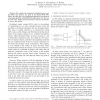Free Online Productivity Tools
i2Speak
i2Symbol
i2OCR
iTex2Img
iWeb2Print
iWeb2Shot
i2Type
iPdf2Split
iPdf2Merge
i2Bopomofo
i2Arabic
i2Style
i2Image
i2PDF
iLatex2Rtf
Sci2ools
109
click to vote
ICC
2009
IEEE
2009
IEEE
Error Resilient Non-Asymmetric Slepian-Wolf Coding
Abstract—We consider non-asymmetric distributed source coding (DSC) that achieves any point in the Slepian-Wolf (SW) region. We study the error propagation phenomena and propose a decoding algorithm which limits this phenomena. For the case of turbo-codes, design rules are derived in order for the decoder to recover the sources. Distributed source coding (DSC) refers to the problem of compressing two or more correlated sources, where the encoding is performed separately but the decoding jointly. This setup is usually referred to as Slepian-Wolf coding (SW), since in [10], Slepian and Wolf derived the theoretical limits of the lossless coding of two correlated memoryless sources. These theoretical limits are given in terms of a set of achievable compression rates, also called the SW region. For two discrete sources, [10] shows the surprising result that the sum compression-rate of the two sources experiences no loss when the encoders cannot communicate. This property is very valuable ...
| Added | 21 May 2010 |
| Updated | 21 May 2010 |
| Type | Conference |
| Year | 2009 |
| Where | ICC |
| Authors | Cédric Herzet, Velotiaray Toto-Zarasoa, Aline Roumy |
Comments (0)

